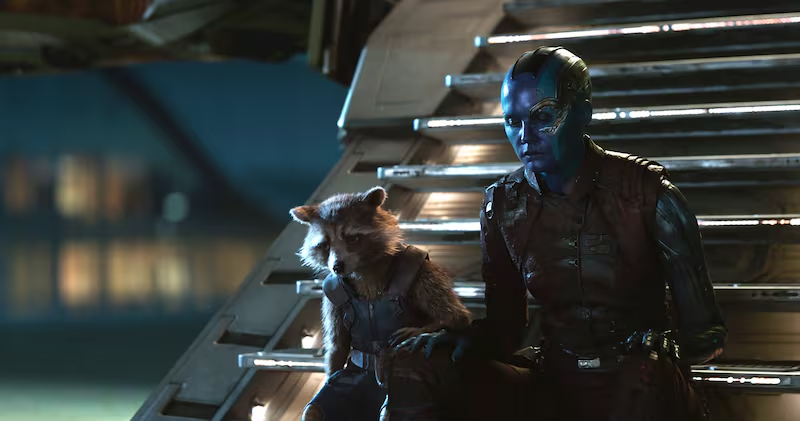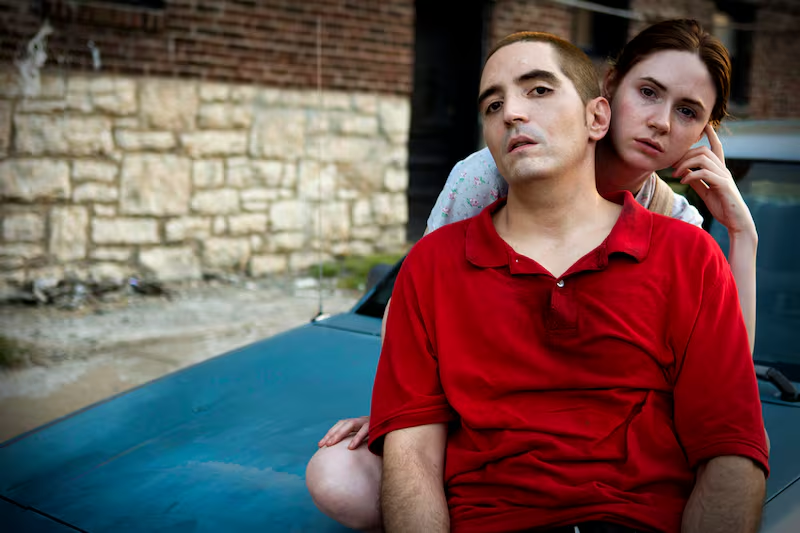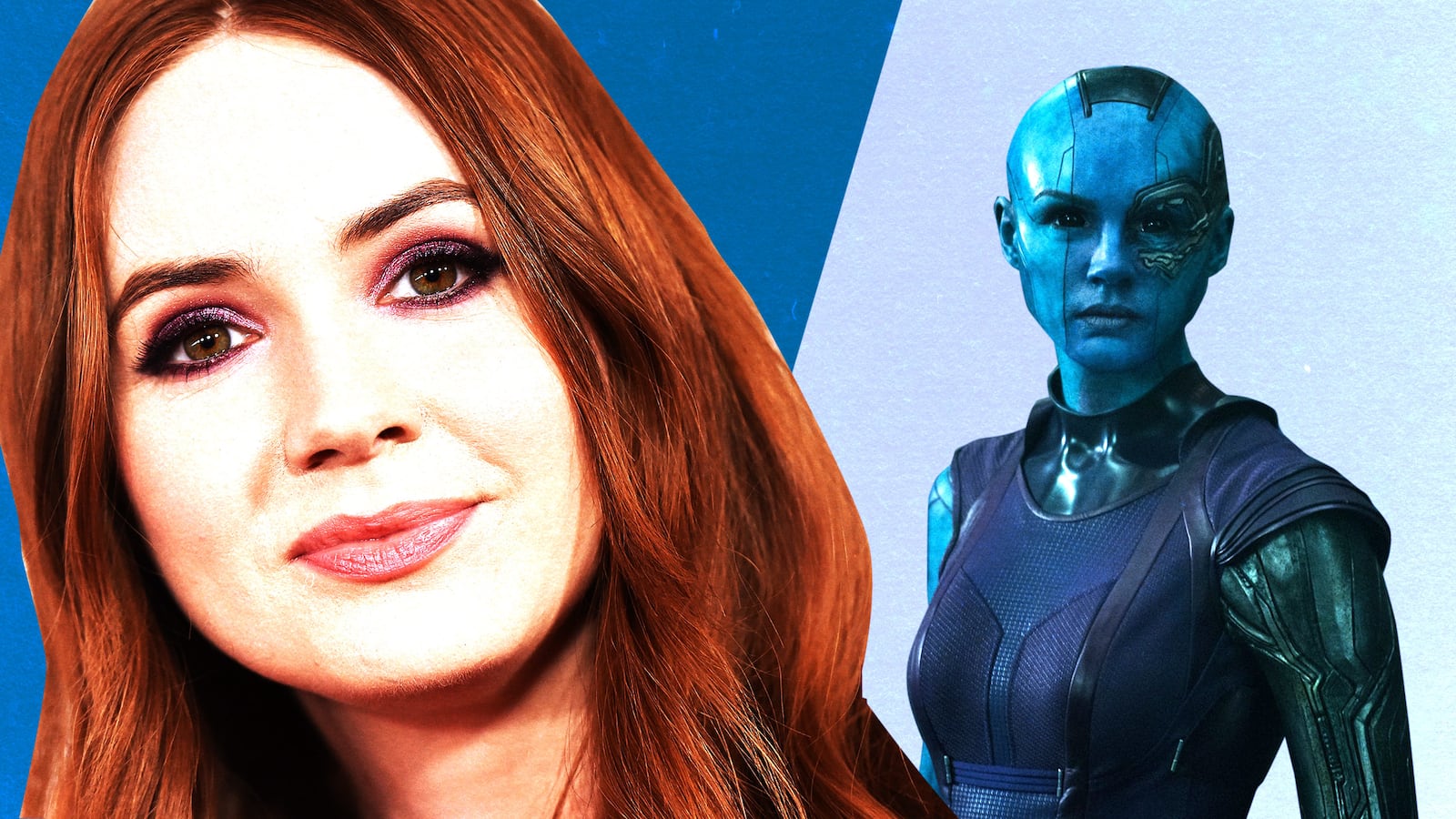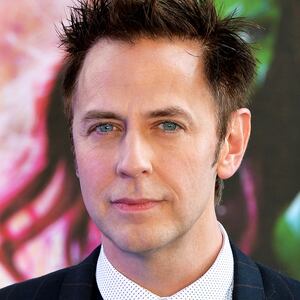Karen Gillan is in a unique professional position.
After co-starring on the 2010-2013 run of Doctor Who, and then transitioning to the big screen (highlighted by 2013’s superb Mike Flanagan horror film Oculus), the 31-year-old Scottish actress made a splash as blue mecha-villain Nebula in James Gunn’s 2014 hit Guardians of the Galaxy. It was a breakthrough part that grew larger in Gunn’s 2017 sequel Guardians of the Galaxy Vol. 2. And it’s now taken an outright prominent position in the Marvel Cinematic Universe courtesy of last year’s Avengers: Infinity War and, more recently, the record-breaking Avengers: Endgame, whose action significantly pivots around Nebula’s continuing drift toward heroism and away from her population-halving father, Thanos (Josh Brolin). In a film that’s fast becoming the most gargantuan box-office hit in global cinema history (it’s currently at No. 2), Gillan stands front-and-center.
Too bad, then, that as the metallic, hairless, black-and-blue Nebula, she’s almost completely unrecognizable.
Even if fans don’t immediately identify the redheaded Gillan as her famous superhero character, her work in Jumanji: Welcome to the Jungle and her directorial debut, The Party’s Just Beginning—all sans concealing makeup and costumes—has helped establish her as one of the industry’s fastest-rising leading ladies. Moreover, her back-and-forth transition between epic and intimate endeavors has confirmed her versatility, which is again on display in All Creatures Here Below, an indie out May 17 about a down-on-their-luck couple (Gillan and David Dastmalchian) whose tormented lives spiral out of control, sending them on a cross-country flight from various forces.
A far cry from her major studio efforts, it’s a modest and troubling drama about abuse. And Gillan’s affecting, unpredictable performance as the child-like Ruby demonstrates her enthusiasm for tackling diverse challenges.
Ahead of the film’s theatrical premiere, we spoke with Gillan about her triumphant (and ongoing) Marvel tenure, her eagerness to re-team with James Gunn on Guardians of the Galaxy Vol. 3, the thrill of playing a character so unlike herself, and the importance of telling stories—big and small—about the abuse women endure.
You’ve just finished worldwide press duties for Avengers: Endgame. Have you gotten used to the larger-than-life scale of everything associated with Marvel movies?
Oh God, I don’t know if it’s something you ever really get used to, because it’s such a unique sensation to be involved in something that’s kind of historical in the cinema world. So no, it’s not something I’m used to, but it’s something I’m constantly so excited to be a part of. It just feels so special, and I feel so lucky that this small character that I played in the first Guardians film got to evolve and develop so much, and then become a part of this huge phenomenon. I’m extremely grateful, is the main word.

Karen Gillan stars as Nebula in 'Avengers: Endgame'
MarvelHave you been surprised at Nebula’s increasing prominence in the franchise, culminating with her key role in Avengers: Endgame?
Yes and no. When I did my first audition for Nebula, which was in London, for the first Guardians film, the scene was between her and Gamora. And it was in reference to her sibling rivalry—her jealousy, and being the overlooked sibling between the two of them. That was something where I read the scene and went, “Ah, I can latch on to that. I understand this girl—this is the element that makes her really interesting.” Then we did the screen test, and I remember it being really emotional—like, there was crying, which was kind of weird because the character was a villain in the first Guardians, and we were in tears [laughs]. So it was this interesting thing where me and James Gunn [writer/director of both Guardians of the Galaxy films] discovered this part of the character that wasn’t really featured in the first Guardians, yet gradually crept in over the course of a few more Marvel movies.
I believed she was going to die at the end of the first Guardians, so I thought, “Oh my God, there’s this really cool thing about this character, but we’re never going to explore that because she dies!” But then they changed the ending and James incorporated more of it into Vol. 2, and it took off from there. So it was kind of surprising that we got to explore it, but not surprising that that’s where the character has ended up.
Now that the spoiler ban has ended, I can say that Nebula survives Endgame. Are you excited about the character’s future, and Guardians Vol. 3, especially with James Gunn back in the writing/directing chair?
Yeah, I’m incredibly excited. I love playing this character more than anything. I’m so passionate about her backstory and where she can go, and I think there’s so much more evolution to be found within her. I’m so excited to explore more of that in the next movie. We’re also so excited that James is back, because it truly wouldn’t have felt like a real Guardians movie without him leading the charge. So yeah, I can’t wait to do the next Marvel movie—I love working with everyone on the team, and [Marvel Studios President] Kevin Feige is a goddamn genius.
How did you feel about Gunn’s dismissal, and then reinstatement? I imagine it was a difficult thing to navigate, given your allegiance to both the studio and Gunn.
It was. It kind of came out of nowhere, so I think a lot of us were shocked for a while. It felt really strange, the whole idea that we were maybe going to make another film without him. But that never sat right with any of us. And I think all of us would agree that we feel that we need him in order to make a real Guardians movie. So it was a really strange position to be in. But we have such loyalty to James Gunn and to Marvel—I love all the guys at Marvel, and they’ve been incredible to all of us. But then it worked out! [laughs] So it’s a lot easier.
Your new film, All Creatures Here Below, definitely operates on a far smaller scale than your Marvel and Jumanji movies, the second of which I know you’re working on now.
We actually wrapped!
Given the size of those films, what was it like to transition back to a more intimate, DIY-style project like All Creatures Here Below?
It was sandwiched between two juggernaut movies for me, and it was a three-week shoot. It was an incredible experience, because you strip away all of the perks that come with the bigger movies. You’re kind of left with, in its most simple form, the thing you most love doing. It felt really nice to just have this thing, because that’s where my love of acting began. If I wasn’t a professional actress and needed another job, I’d be taking part in amateur local theater, because I love it so much. It felt really good to reconnect with that a little bit. But to be honest, it also felt the same in a sense. Because yes, you might get treated a little better on a big movie. But ultimately, when the director shouts action, it’s the same. You’re doing the same job, and it doesn’t matter what environment you’re in in those moments.
Is it important for you, creatively, to move between tentpole fare and more modest, character-driven work like this?
I think it’s all about playing characters and telling stories that I want to tell. Truthfully, I don’t differentiate too much, creatively, between an indie movie and a giant Marvel movie, because I’d argue that Marvel movies are an extremely creative experience. I have felt so creatively free and supported in those environments, and because they have the time and the money, it allows me to spend a long time exploring all these different avenues with my character—there’s an infinite number of ways you can deliver a line, and they really let you go there, if you want to. I’d say in some ways, it can be more freeing than an indie movie, where you get two shots at this, and then we’re moving on [laughs]. But also, in a Marvel movie, there’s a lot of green-screen days and action stuff, and that obviously feels a little less character-driven. With indie movies, the emphasis is a little more on the character stuff.
What was it about Ruby that spoke to you?
I had never read a character and script like that before, or seen one in a film. And it certainly wasn’t something I’d played before, so I felt like that was going to be a challenge. It felt like such a departure from myself, and that’s always exciting for me. Because that’s where I get my joy from acting—inhabiting completely different people. The characters I play aren’t really extensions of myself; I’m more trying to fit myself into them a little bit. I just thought, who is this person, and how do I find a way to relate to her? It felt like a big ol’ challenge, really.
Ruby is not a glamorous role, and very removed—superficially—from your sexy videogame avatar part in Jumanji. Is that also part of the appeal, and challenge, of a project like this?
It definitely is, because I think the image of the character is an extension of who they are inside. It’s a really useful way to explain to the audience who this person is, very quickly. I don’t really look at a role and think, “Oh, I could look totally different here.” But if I feel the character is totally different, then I know that’s going to manifest in a completely different look as well. It was also nice to play this role because, I mean, I literally didn’t wear any makeup. Not even makeup that’s meant to look like no makeup. There wasn’t a scrap on. There was something amazing and freeing about that.
Ruby is very childlike. Did you do anything in particular—research, or talking to people who’ve been in similar circumstances—to prepare for the part?
I spend ages preparing for roles—as long as I can get, from the moment I sign on until I’m doing it. It mainly starts with the script, and working within the realm of the piece. Then once I understand the person from all that information, I can, like a detective, start branching out to other things. I read a lot of psychology essays to try to understand what psychological conditions could exist if someone is working through this type of trauma. I’m looking for pieces that I can play, or use, within the character. And sometimes I’ll find this one key element that unlocks everything, and it’s like, “Oh, OK, this thing happened when she was 11 years old, and so she’s remained an 11-year-old for the rest of her life,” or something like that. It’s a lot of different types of research.

Karen Gillan and David Dastmalchian in 'All Creatures Here Below'
Samuel Goldwyn FilmsI imagine working on a small-scale film like this is a very collaborative experience. Did it help that your co-star, David Dastmalchian, was also the writer?
It certainly doesn’t hurt. What was so great about that was that he wasn’t precious about his writing. His writing was so good, but he was OK with me interpreting it in my way, because I’ll happily deliver it the way it was intended, but also I have other ideas for things. He was so supportive of that, and it was a huge collaboration. He’s such an incredible actor, and he felt like an actor on set, not a writer. He left that role behind, and was purely focused on playing this character, and helping me play mine. We bounced off of each other, and honestly didn’t know where we were going to end up, from scene to scene, because we were being so present, and listening to and helping each other, which was so cool.
The film’s climactic revelation casts its portrait of abuse in a surprising light. Was shooting some of the earlier material—including one intimate scene in particular—more difficult because you had to suggest a truth you couldn’t outright reveal?
What we both set out to do with that scene was to try to play it as realistically as possible. So it wasn’t thinking so much about not giving stuff away to the audience; it was more like, this is a messed-up situation, but why are we doing it, and how would they do it if this was real life? That’s all that really mattered. Keeping it truthful and sincere. It’s a very strange thing to figure out. That was something we had to discuss a lot—how would this moment play out.
It eventually becomes clear that Ruby is a victim of not only circumstance, but of a father figure—which is also true of Nebula. Was that similarity a coincidence, or did it come from a deliberate desire (especially in this #MeToo era) to focus on stories about abuse?
It certainly wasn’t something I was seeking out. I wasn’t actively looking for characters who have suffered abuse from their father figures; I think that’s just a coincidence. I’m looking for characters who I find complex and would find interesting to explore and play. But I do think it’s really important to show characters like that, because that stuff happens, unfortunately, in this world. And I don’t think we should shy away from showing that, especially if somebody might watch it and think, “I understand what I’ve been through a little better now.” I think that’s a really good thing.


